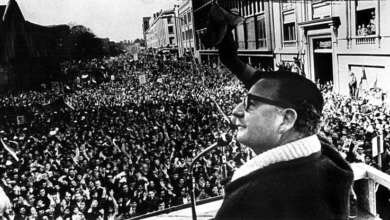On Oct. 15, over nine million Ecuadorans, including Ecuadorans living abroad, will vote for the eighth president in the last nine years. The last president who successfully completed his term, from 1992-1996, was the conservative Sixto Durán Ballén.
Since 1996, the political history of Ecuador has been characterized by instability. In this period, there have been various
|
Less than three months before the elections, the right and left parties have not chosen their running mates for vice president, and there is uncertainty about the alliances among the parties and the social movements.
What assurances are there that whoever is elected in October will remain in office the whole term, which, by the constitution, should run from Jan. 15, 2007, to Jan. 15, 2011?
The rise and fall of eight governments in nine years is due to several factors: The struggle of the Ecuadoran people to protect the country from neoliberal policies and privatization; the defense of national sovereignty; the struggle to improve the conditions of life for the exploited and oppressed; the struggle for ethnic, gender and LGBT equality; and the struggle for recognition of Ecuador as a multinational and multiethnic state.
In other words, it is the social struggle itself that will determine who is voted in and for how long the president remains.
The campaign of Luis Macas, president of the Confederation of Indigenous Nationalities in Ecuador and presidental candidate for Pachakutik, is decisive in this pre-election period. Macas is the candidate of the Indigenous movement—the most combative and important movement of the country at this time. His political project combines the Indigenous historical perspective of creating a multinational state and broader national politics. One does not exclude the other.
In a press conference on June 8, Macas presented his “Proposal for the electoral primaries. Toward a left front,” with the aim of initiating the construction of a “Social and Political Inter-Cultural Front.”
Among other things, Macas said, “The Indigenous movement and the social movements have been clear in their political proposals for the nationalization of the natural resources, defense of biodiversity, abrogation of the agreement granting the Manta military base to the United States, agrarian reform, tax reform that provides for a redistribution of income, a Constituent Assembly to dismantle the juridical structure that was created by neoliberalism, among other issues.”
The October elections in Ecuador could be strategic in reconfiguring the South American regional map. Recently, there have been several pro-imperialist electoral victories on the continent—Alan García of Peru and Alvaro Uribe in Colombia. These two, and other sitting presidents, are opposed to the anti-imperialist alliance formed by Cuba, Venezuela and Bolivia.
The victory of an anti-imperialist candidate in Ecuador would strengthen the bourgeoning progressive regional alliance.







